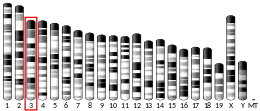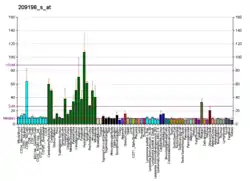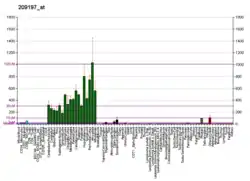SYT11
Synaptotagmin-11 is a protein that in humans is encoded by the SYT11 gene.[5][6]
Interactions
SYT11 has been shown to interact with Parkin (ligase).[7]
References
- GRCh38: Ensembl release 89: ENSG00000132718 - Ensembl, May 2017
- GRCm38: Ensembl release 89: ENSMUSG00000068923 - Ensembl, May 2017
- "Human PubMed Reference:". National Center for Biotechnology Information, U.S. National Library of Medicine.
- "Mouse PubMed Reference:". National Center for Biotechnology Information, U.S. National Library of Medicine.
- Craxton M (September 2001). "Genomic analysis of synaptotagmin genes". Genomics. 77 (1–2): 43–9. doi:10.1006/geno.2001.6619. PMID 11543631.
- "Entrez Gene: SYT11 synaptotagmin XI".
- Huynh DP, Scoles DR, Nguyen D, Pulst SM (October 2003). "The autosomal recessive juvenile Parkinson disease gene product, parkin, interacts with and ubiquitinates synaptotagmin XI". Human Molecular Genetics. 12 (20): 2587–97. doi:10.1093/hmg/ddg269. PMID 12925569.
Further reading
- Nomura N, Nagase T, Miyajima N, Sazuka T, Tanaka A, Sato S, Seki N, Kawarabayasi Y, Ishikawa K, Tabata S (1995). "Prediction of the coding sequences of unidentified human genes. II. The coding sequences of 40 new genes (KIAA0041-KIAA0080) deduced by analysis of cDNA clones from human cell line KG-1". DNA Research. 1 (5): 223–9. doi:10.1093/dnares/1.5.223. PMID 7584044.
- Mizutani A, Fukuda M, Ibata K, Shiraishi Y, Mikoshiba K (March 2000). "SYNCRIP, a cytoplasmic counterpart of heterogeneous nuclear ribonucleoprotein R, interacts with ubiquitous synaptotagmin isoforms". The Journal of Biological Chemistry. 275 (13): 9823–31. doi:10.1074/jbc.275.13.9823. PMID 10734137.
- Huynh DP, Scoles DR, Nguyen D, Pulst SM (October 2003). "The autosomal recessive juvenile Parkinson disease gene product, parkin, interacts with and ubiquitinates synaptotagmin XI". Human Molecular Genetics. 12 (20): 2587–97. doi:10.1093/hmg/ddg269. PMID 12925569.
- Glass AS, Huynh DP, Franck T, Woitalla D, Müller T, Pulst SM, Berg D, Krüger R, Riess O (2004). "Screening for mutations in synaptotagmin XI in Parkinson's disease". Journal of Neural Transmission. Supplementum. Journal of Neural Transmission. Supplementa. 68 (68): 21–8. doi:10.1007/978-3-7091-0579-5_3. ISBN 978-3-211-21114-4. PMID 15354386.
- Rual JF, Venkatesan K, Hao T, Hirozane-Kishikawa T, Dricot A, Li N, Berriz GF, Gibbons FD, Dreze M, Ayivi-Guedehoussou N, Klitgord N, Simon C, Boxem M, Milstein S, Rosenberg J, Goldberg DS, Zhang LV, Wong SL, Franklin G, Li S, Albala JS, Lim J, Fraughton C, Llamosas E, Cevik S, Bex C, Lamesch P, Sikorski RS, Vandenhaute J, Zoghbi HY, Smolyar A, Bosak S, Sequerra R, Doucette-Stamm L, Cusick ME, Hill DE, Roth FP, Vidal M (October 2005). "Towards a proteome-scale map of the human protein-protein interaction network". Nature. 437 (7062): 1173–8. Bibcode:2005Natur.437.1173R. doi:10.1038/nature04209. PMID 16189514. S2CID 4427026.
- Inoue S, Imamura A, Okazaki Y, Yokota H, Arai M, Hayashi N, Furukawa A, Itokawa M, Oishi M (April 2007). "Synaptotagmin XI as a candidate gene for susceptibility to schizophrenia". American Journal of Medical Genetics Part B. 144B (3): 332–40. doi:10.1002/ajmg.b.30465. PMID 17192956. S2CID 34046711.
This article is issued from Wikipedia. The text is licensed under Creative Commons - Attribution - Sharealike. Additional terms may apply for the media files.





